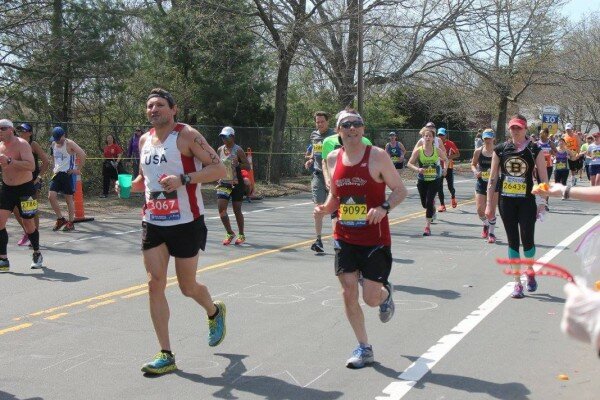The Autism Research Foundation would like to extend a big big thank you to Dan Dugan! Thank you so much for supporting the work of The Autism Research Foundation, and thanks to those who supported Dan in his 2016 Boston Marathon run. TARF is grateful for all contributions to its effort to unravel the complexity of autism and to help those with this disorder. Dan is the one in red!
Uncategorized
The Autism Research Consortium 2016
On February 20-21, 2016, TARF hosted 21 researchers and clinicians from all over the United States and Canada. In attendance were geneticists, immunologists, gastroenterologists, neuroanatomists, neuropathologists, pediatricians, psychiatrists, neuroscientists, and various other researchers. General themes that were discussed were the heterogeneity of autism, the challenges of integrating the findings of all the different disciplines, and the difficulty of interpreting the flood of data that autism research faces.
Appreciating Autism Can Change Your Life
Autism changed my life.
Not because I have autism (I don’t), but because my outlook on my own life changed when I chose to pay attention to the autism community around me.
Awareness of your own life is a choice.
Awareness of autism is a choice.
There is so much to learn from this growing community, like how people with autism and their families celebrate life daily:
- Trying new foods
- Learning new words
- Making genuine eye contact with people
- Initiating social activities, like playing a game or eating a meal with company
- Working at a meaningful job
- Hugging or high-fiving friends
These may seem like everyday occurrences to you, but when was the last time you stepped back to appreciate the “little things” that make life your so big and beautiful?
You should know that what the typical population calls “little things” are really “big things” to someone with autism. Autism makes socializing challenging. It makes change and newness uncomfortable. It makes learning difficult. When we live in a world that demands we socialize, change, and learn everyday, that makes life with autism pretty darn hard.
Today, and everyday, I hope you might pause and be grateful all of your “little things” a little more: thinking about how hard enjoying life can truly be for someone on the spectrum, but appreciating that they and their families can still find the time to celebrate a beautiful moment.
When you choose to acknowledge how great, often easy, and enjoyable your life is, you are choosing to acknowledge there are people who may not have it as great, easy or enjoyable at times.
It’s uncomfortable, but it’s the truth that we all can help families experiencing autism by acknowledging that we know they get the shorter end of the stick. Don’t avoid families with autism because you think you’ll make them feel bad about their lives; instead, support them by saying “I See You” and I see how different this is for you and celebrate their family’s successes wholeheartedly.
When you choose to be aware, you enjoy your life even more, and you see the opportunities you are gifted everyday to make someone else’s life that much more enjoyable, too. Remember, the little things really are the big things.
Please join in the mission of our 2 great friends, Dan and Mary Beth, as they Walk Across America for Autism Awareness.
There’s a whole lot of goodness to appreciate and celebrate out there. Will you be aware and share?
Start with sharing this post on Facebook: it might seem like a little thing to you, but it can lead to big things for someone else.
Brain Tissue Freezer Needs Replacement
As we have begun planning for the 2014-2015 academic research year, The Autism Research Foundation has identified multiple material needs to advance its neurobiology work.
Most importantly, Dr. Margaret Bauman’s autism lab at the Boston University School of Medicine will require the purchase of a new brain tissue freezer to replace an outdated model in January 2014.

Her existing tissue freezer is at-risk for malfunctioning and has already suffered a substantial power shortage due to old age. Luckily, our staff was prepared to remedy this emergency this time and all of our tissue is safe, secure and uncompromised, but we do not want to rely on unreliable equipment in the future. There is no guarantee that the power shortage will not happen again, so we have rented a more reliable tissue freezer to use in the meantime.
What’s so risky about a power shortage with the brain tissue freezer?
Brain tissue is the most valuable component of our research. It is something we cannot buy or sell; individuals with and without autism choose to donate their brain tissue to science by remembering The Autism Research Foundation in their wills and after-life care plans.
The brain tissue freezers are set at a strict -80 degree Celsius temperature, which keeps the valuable tissue in optimal working condition when we are not physically investigating the tissue at our lab benches.
When a power shortage occurs, that important -80 degree Celsius temperature is not maintained and we risk thawing the brain tissue. If this happens, the brain tissue is damaged and cannot be used for research anymore.
How can I help?
This new replacement freezer will cost The Autism Research Foundation $20,000.00. When you donate toward our new brain tissue freezer, all funds go directly toward the purchase of the new, vital equipment. Every little bit helps!
My button
Please share this page with your family and friends, so that they can help us spread the word, too.
Looking to contribute in other ways? More needs can be found on our Wish List.





